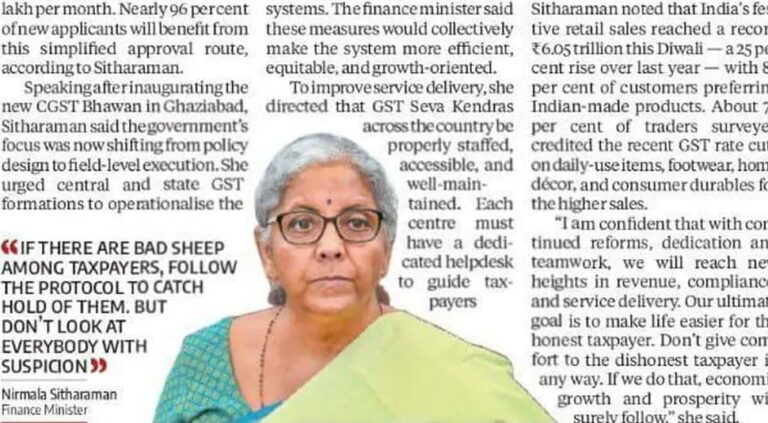In a major step towards easing compliance and boosting business confidence, Finance Minister Nirmala Sitharaman announced the launch of a simplified GST registration system under GST 2.0, effective November 1, 2025. The new framework will enable automatic approval of GST registration within three working days for most new applicants, significantly reducing human interface and processing delays.
Automatic GST Registration for 96% of New Applicants
As part of the GST 2.0 reforms package approved by the GST Council, the revamped registration system leverages data analytics and risk-based assessment to streamline approvals.
Automatic registration will be granted in two cases:
- Applicants identified as low-risk based on system-driven data analysis, and
- Businesses self-assessing that their output tax liability will not exceed ₹2.5 lakh per month.
According to Sitharaman, nearly 96% of new applicants will benefit from this simplified approval process, marking a major milestone in the government’s ongoing efforts to digitize and automate tax administration.
“System by Design, Not by Discretion”
Speaking at the inauguration of the new CGST Bhawan in Ghaziabad, the finance minister emphasized that the government’s focus is now shifting from policy formulation to effective field-level implementation.
“If there are bad sheep among taxpayers, follow the protocol to catch hold of them. But don’t look at everybody with suspicion,” Sitharaman said, reiterating the need for trust-based tax governance. She urged officers of the Central Board of Indirect Taxes and Customs (CBIC) to ensure that the new system operates “by design, not by discretion.”
Broader Reforms Under GST 2.0
The GST 2.0 package also includes several complementary reforms aimed at enhancing efficiency, transparency, and taxpayer convenience. Key highlights include:
- Rationalisation of GST rate slabs
- Simplified return filing system
- Automated refund mechanism
- Risk-based audit framework
Sitharaman stated that these reforms collectively aim to make the GST regime more efficient, equitable, and growth-oriented.
GST Seva Kendras to be Strengthened
To ensure smooth taxpayer services, the finance minister directed that GST Seva Kendras across India be properly staffed, accessible, and regularly audited. Each centre must have a dedicated helpdesk to assist taxpayers during the registration and compliance process.
Emphasis on Administrative Integrity
Reinforcing the importance of integrity within tax administration, Sitharaman called for swift conclusion of disciplinary proceedings against erring officers to maintain accountability.
She stated, “Wrongdoers can’t escape; no enmity with those who are right.”
Record Festive Sales Linked to GST Rate Cuts
Quoting data from the Confederation of All India Traders (CAIT), the minister highlighted that India’s festive retail sales hit a record ₹6.05 trillion this Diwali — a 25% increase over last year. Nearly 87% of consumers preferred Indian-made products, with 72% of traders crediting the recent GST rate cuts on essential and consumer goods for the surge in sales.
Focus on Ease of Doing Business
Sitharaman concluded that continued reforms under GST 2.0 will enhance revenue collection, compliance, and taxpayer satisfaction, ensuring that honest taxpayers feel respected and supported.
“Our ultimate goal is to make life easier for the honest taxpayer. Don’t give comfort to the dishonest taxpayer in any way. With fairness and efficiency, economic growth and prosperity will follow,” she affirmed.
Key Takeaways
- GST 2.0 registration begins November 1, 2025, with auto-approval in 3 days.
- 96% of new GST applicants expected to qualify for simplified approval.
- System-based risk analysis to replace manual scrutiny.
- Rate rationalisation, auto-refunds, and simplified returns to ease compliance.
-
Focus on dignity for taxpayers and accountability for officials.
